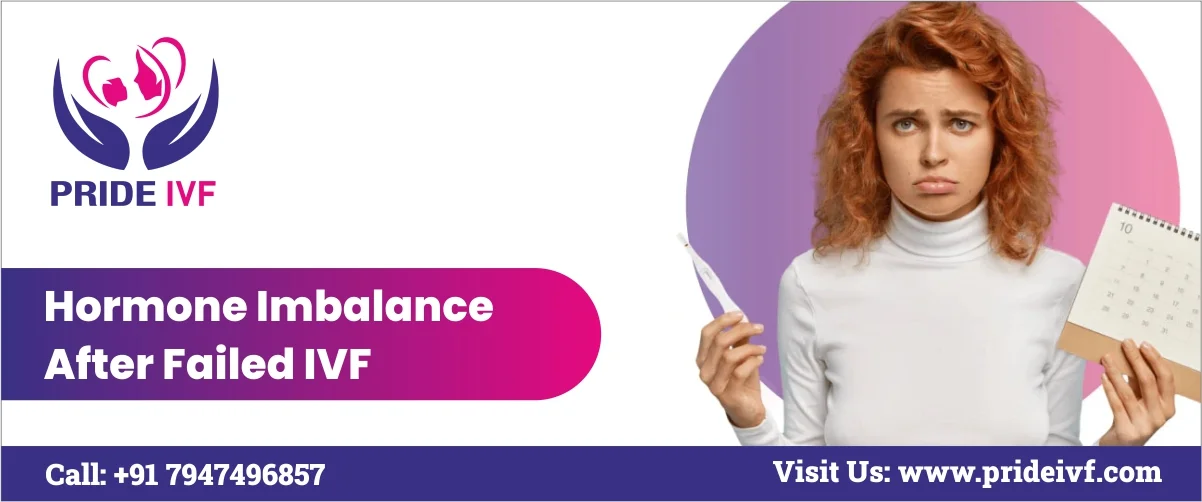Hormonal imbalances after In Vitro Fertilization (IVF) are normal and may affect both physical and emotional well-being of a woman, making it crucial to address them with care and precision.
Several strategies combined, including eating a healthy diet, making lifestyle changes, exercising, seeking professional guidance, and finding emotional support, can be useful towards optimizing hormone levels. In this blog, Pride IVF Centre in Delhi experts will discuss how to tackle hormonal imbalance after failed IVF, and help you with some practical tips to navigate this challenging phase and rejuvenate your body and spirit.
With some careful strategies, women can balance their hormones after their IVF cycle. After all, restoring hormonal balance after IVF is vital for fertility and overall health.




What is In Vitro Fertilisation or IVF?
IVF Kya Hai: In Vitro Fertilization, or IVF, is an Artificial Reproductive Technology (ART) procedure that enables individuals or couples to fulfil their dream of becoming parents. In this procedure, a woman’s fully developed eggs are removed from her ovaries and fertilized in a laboratory using sperm from a male partner or donor. The developed embryos are placed inside the uterus to continue developing into the baby.
IVF is considered to be a viable option for individuals and couples who are experiencing difficulties conceiving. Even though IVF has higher success rates than other ART methods, the outcomes vary depending on a number of factors, including the age of the woman, the quality of her eggs, her lifestyle, and a host of other factors. Also Read: Why IVF Fails?
Hormonal Imbalance After Failed IVF
Hormonal imbalances following an unsuccessful IVF cycle can arise for a number of reasons. It’s critical to understand the critical role that reproductive hormones like progesterone, estrogen, and testosterone play in fertility. They control menstrual cycles, aid in the implantation of embryos, and preserve a healthy pregnancy. These hormones interact while maintaining a delicate balance. However, a number of conditions, including stress, thyroid issues, and polycystic ovarian syndrome (PCOS), can impact this delicate balance and trigger a hormonal imbalance in the body. Also read: What Happens To Your Body After Failed IVF?
High levels of androgens, or male hormones, can interfere with ovulation and make it more difficult to conceive in the cases of PCOS. The synthesis of reproductive hormones can also be impacted by an underactive or hyperactive thyroid. Cortisol, a stress hormone that can disrupt the regular activity of reproductive hormones, is released in response to both physical and emotional stress.
Women who’ve undergone IVF can take proactive measures to restore hormonal balance. This is possible by being aware of the possible hormonal fluctuations that may occur after IVF and their effects on your general health.
It is essential that you get in touch with a fertility specialist who can evaluate your particular circumstances and help you navigate the process.
Understanding the Signs of Hormonal Imbalance After Failed IVF
Hormonal imbalance after failed IVF can exhibit various signs and symptoms. Here are the most common signs and symptoms of hormonal imbalance after a failed IVF procedure:
- Mood Swings: Progesterone and estrogen are two hormones that help control mood. Feelings of melancholy, irritability, or even unexpected joy can result from fluctuations.
- Sleep disturbances: This encompasses excessive sleeping or insomnia.
- Weight Changes: You could gain or lose weight for no apparent reason.
- Skin problems can include breakouts, dry skin, or even extremely oily skin.
- Fatigue: Hormonal changes may be the cause of feeling exceptionally exhausted or depleted.
- Headaches: Hormonal headaches may occur more frequently, particularly during the menstrual cycle.
- Digestive Problems: These include bloating, indigestion, and even IBS (irritable bowel syndrome).
- Breast Tenderness: There may be lumpiness or soreness in the breasts.
Lets get started
How To Tackle Hormonal Imbalance After Failed IVF?
While it’s always best to seek medical advice to manage hormonal levels after a failed IVF, there are several things a person can do themselves. This includes incorporating some healthy habits into the lifestyle, and practising some stress management techniques. Here are some tips to tackle hormonal imbalance after failed IVF:
Eat a Balanced Diet: Choosing a diet high in magnesium, vitamin B6, and omega-3 fatty acids can help maintain hormonal balance. Essential fatty acids are provided by omega-3 sources like salmon, and foods high in magnesium, like nuts, are good for your general health. Bananas contain vitamin B6, which helps to maintain a balanced physiological state by regulating hormones.
Limit Alcohol & Caffeine Intake: Alcohol and caffeine can both upset the balance of hormones, making symptoms of these hormonal imbalances worse. By reducing use, these drugs’ detrimental effects on hormone levels can be decreased, promoting general wellbeing.
Engage in Mild Exercise: Walking, yoga (fertility yoga poses), or swimming are examples of regular, mild exercise regimens that can help control hormone levels. Engaging in physical activity triggers the release of endorphins, which have the ability to reduce stress and support hormonal equilibrium.
Manage your Stress Levels: Stress levels can be considerably lowered by incorporating stress-reduction strategies like deep breathing exercises, meditation, or engaging in the favourite hobbies. This can help with hormone regulation. Through lowering cortisol levels and encouraging relaxation, these techniques support a hormonally more balanced state.
Monitor Your Fluid Intake: Water is a key component in the body’s process of eliminating excess hormones and toxins, which makes it imperative to maintain adequate hydration for hormonal balance. Hormone regulation and metabolism are two of the best bodily functions that are supported by maintaining adequate hydration in the body.
Consult a Professional: It is imperative to seek medical advice when symptoms of a hormonal imbalance are severe or persistent. In order to effectively restore balance and relieve symptoms, a healthcare provider can evaluate each patient’s unique hormone levels and suggest the best course of action, which may include hormonal supplements or other prescription drugs.
Alternative Therapy To Manage Hormonal Imbalance After Failed IVF
To treat hormone imbalance after failed IVF, some people like to use herbal remedies and other alternative therapies in addition to conventional treatments; however, it’s important to speak with a gynaecologist before beginning any new treatments. Common options include herbal teas like red clover and raspberry leaf, which are known for positively affecting hormone levels, but are best used with medical advice; acupuncture, which can aid in hormone balance and stress reduction when administered by a qualified practitioner; Vitex (Chasteberry), which is believed to regulate the menstrual cycle but requires caution due to potential medication interactions; and mind-body techniques like guided imagery and meditation, which can promote relaxation and overall well-being. Although these methods have potential, they should supplement medical advice rather than take its place, stressing the significance of consulting a professional before using them to treat hormonal imbalance after failed IVF.
Conclusion
Most women experience a hormone imbalance after failed IVF. However, it’s normal, and can be managed with proactive measures. By implementing the right strategies to prevent or reverse this hormonal imbalance, and taking the doctor’s advice, women can easily recover.




